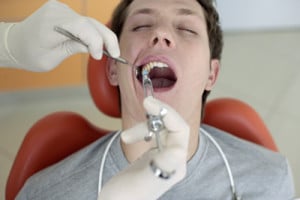Somewhere around the age of 18-20, a third set of molars typically erupt in most people’s mouths; known as “wisdom teeth” (because presumably by then you’re just starting to accumulate a little wisdom), there’s nothing about the teeth themselves that precludes using them for the same sorts of tasks your other molars handle, e.g. chewing and grinding food. The trouble develops when those wisdom teeth grow in incorrectly, and the vast majority of them come are either impacted (unable to grow in) or only partially erupted (caught up in the gums).
Both impacted and partially erupted teeth anywhere in the mouth are prone to infection, which can cause uncomfortable swelling and the formation of cysts, which are small fluid-filled growths that cause pain inside the gums. In both situations surrounding teeth are in jeopardy, as these infections can spread to healthy teeth and bone tissue and cause serious health complications.
In some cases, of course, wisdom teeth come in straight and with plenty of room, and can be kept inside the mouth where they’ll become a useful part of the “tooth family”; similarly, in some cases your dentist can help slightly crooked wisdom teeth to erupt completely and in good alignment. However in the overwhelming majority of cases, wisdom teeth cause problems that simply cannot be ameliorated, and the proper course of action is an extraction.
Tooth extraction is one of the oldest and most commonly performed procedures at the dentist, and modern dental techniques and anesthetics have made the process quick, safe, and almost completely pain free. Complications after an extraction are very rare, and with proper oral hygiene and regular visits to the dentist for examinations and cleanings, life without wisdom teeth can be quite easy; for more tooth wisdom, contact our office for an appointment today!
